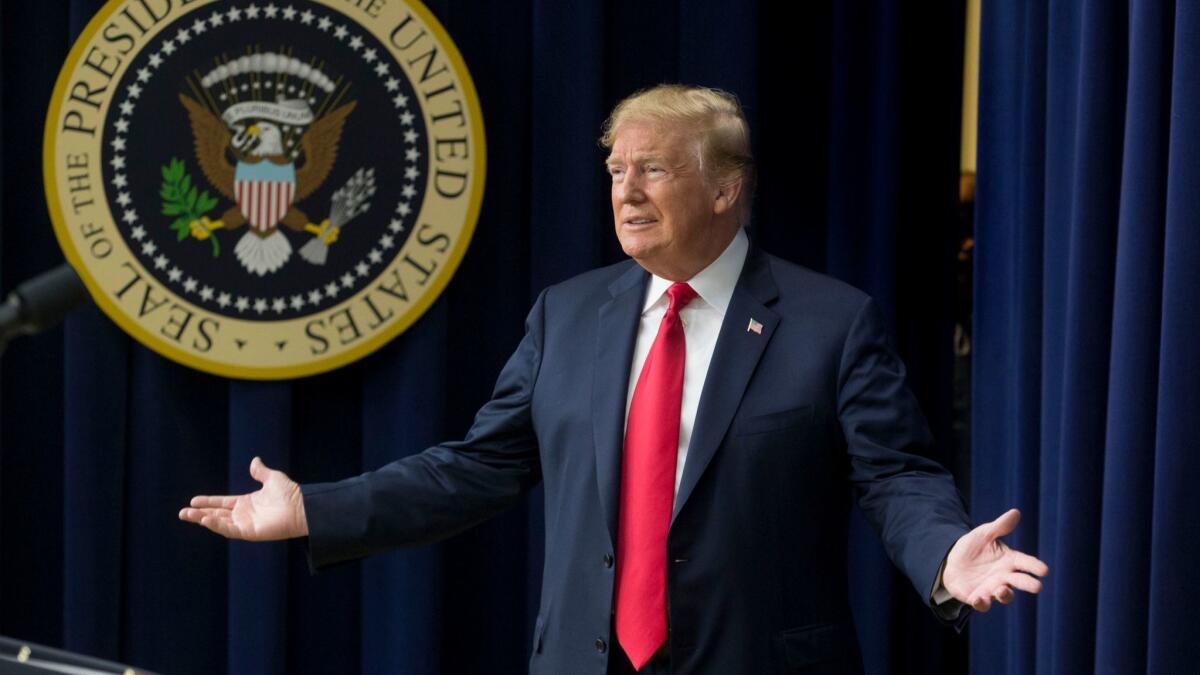Opinion: It turns out Trump’s family separation program wasn’t just cruel, it was incompetent

Two persistent themes mark the Trump administration: Spontaneity, and cruelty. Late Tuesday night, U.S. District Court Judge Dana M. Sabraw in San Diego ordered the government to end one product of those two themes – separating migrant children from their parents. The judge also ordered the government to reunite the families within 30 days, or within 14 days for minors under the age of 5.
That government officials ever thought that inflicting such trauma and cruelty on people would be a good idea shocks the conscience, to invoke a legal standard, while exposing – again – the coldness that lies at the heart of this administration.
The case, filed by the American Civil Liberties Union, was brought initially on behalf of a mother from the Democratic Republic of the Congo who, as a Catholic, faced persecution in her home country. So she did what she was allowed to do under international treaties and U.S. law: She showed up at the San Ysidro border crossing and asked for asylum.
After passing an initial “credible fear” interview with a border agent, the mother and her 6-year-old daughter were detained together for a few days before, and without explanation, the girl was spirited away to Chicago because, the government said, they were uncertain whether the woman was actually the child’s mother. That was an unconscionable act that, according to court documents, has been repeated many times over with other asylum seekers.
It is unacceptable that the government’s response to a lawful application for asylum led to the incarceration and separation of children from their parents.
The government eventually released the mother and, following a court order, conducted a DNA test that affirmed the family relationship, and the mother and daughter were reunited – five months after they were torn apart.
It’s astonishing that the government took away the child based on a suspicion that it had the means to investigate, but did not bother do until a court ordered it to.
Much of the focus in recent weeks has been on the government’s separation of families that it detains after catching them crossing the border without permission between ports of entry; the government has charge of some 2,000 minors it took from parents who crossed illegally into the country.
But note that the incident that sparked this case, and injunction, did not involve an act of illegal entry. It was in response to a plea for sanctuary.
It is unacceptable that the government’s response to a lawful application for asylum led to the incarceration and separation of children from their parents.
Another thing this sorry episode exposed is the administration’s functional incompetence. The policy to separate families was put in place without a plan for how to effect it.
The government’s reasoning is that people who enter the country between ports of entry without permission commit a misdemeanor, which is true. Past administrations have used prosecutorial discretion and rarely filed the misdemeanor charge in such circumstances, but under Atty. Gen. Jeff Sessions’ “zero tolerance” policy, nearly everyone caught gets charged.
The government also chooses to hold those defendants in detention rather than giving them appearance tickets for later court dates.
And because the parents are incarcerated, the government removes their children and treats them as though they were unaccompanied minors and turns them over to the Office of Refugee resettlement under the Department of Health and Human Services pending deportation proceedings.
But the government has no system for those two departments – Homeland Security and Health and Human Services – to keep track of the family relationships.
As Sabraw wrote, “[T]the practice of separating these families was implemented without any effective system or procedure for (1) tracking the children after they were separated from their parents, (2) enabling communication between the parents and their children after separation, and (3) reuniting the parents and children after the parents are returned to immigration custody following completion of their criminal sentence. This is a startling reality.”
The judge pointed out that “the government readily keeps track of personal property of detainees in criminal and immigration proceedings” but failed to do so with detainees’ children.
“The unfortunate reality is that under the present system migrant children are not accounted for with the same efficiency and accuracy as property,” Sabraw wrote.
The government, of course, has the right to appeal the judge’s ruling. It shouldn’t. It also should move even faster than the judge ordered in reuniting these families, and must free them from detention. There are other methods for ensuring they will show up for court than imprisoning them.
Follow my posts and re-tweets at @smartelle on Twitter
More to Read
A cure for the common opinion
Get thought-provoking perspectives with our weekly newsletter.
You may occasionally receive promotional content from the Los Angeles Times.











